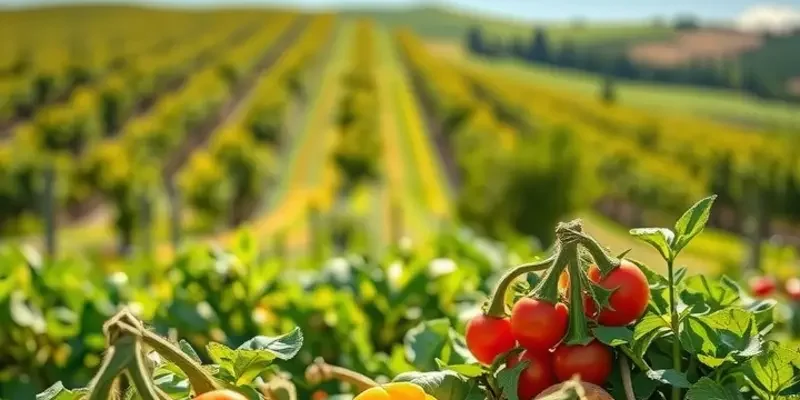Street food enthusiasts and eco-conscious individuals alike are increasingly drawn to the idea of sustainable eating. With a world of flavors at your fingertips, exploring eco-conscious street food offers not just delicious options but also a chance to support local communities and the planet. This guide will delve into the principles of eco-friendly street food and share practical tips on how to make sustainable choices in your culinary adventures.
Principles of Eco-Conscious Street Food

Understanding the core principles of eco-conscious street food is crucial to making informed and impactful choices. By adopting practices like sourcing local ingredients, reducing waste, and adhering to ethical food practices, street food vendors can make a substantial difference.
One key principle of eco-conscious street food is the emphasis on sourcing local ingredients. This practice not only supports local farmers but also reduces the carbon footprint associated with transporting goods over long distances. Fresh, locally-sourced ingredients often mean better flavor and nutrition, making the meals not only sustainable but also delicious.
Reducing waste is another cornerstone of eco-friendly street food. Vendors are increasingly adopting practices such as composting organic waste, using biodegradable packaging, and upcycling leftovers into new dishes. These initiatives help lower the environmental impact of food service operations significantly. Furthermore, they contribute to a circular economy, efficiently utilizing resources to minimize waste.
Ethical food practices play a pivotal role in eco-conscious street food as well. Vendors committed to sustainability often prioritize fair trading, humane sourcing of animal products, and transparency in their ingredient sourcing. By choosing to support these vendors, consumers can play a part in promoting a more equitable food system.
Supporting local vendors who prioritize sustainability has immense benefits for communities. It fosters economic resilience by keeping money within the community and stimulating local economies. Additionally, sustainable street food often creates opportunities for community engagement and education around local food systems.
Eco-conscious vendors are redefining street food by forging new paths in sustainable eating. Initiatives like urban farming partnerships or collaborations with local artisans offer fresh perspectives on traditional street food. These vendors often set the stage for innovative approaches that elevate both sustainability and culinary artistry.
The impact of eco-conscious street food on communities is profound. It contributes to a healthier environment by reducing pollution and conserving natural resources. Furthermore, it strengthens cultural ties by preserving traditional food practices while adapting to modern sustainability challenges. For insights into further reducing kitchen waste at home, check these eco-smart storage tips.
As consumers, seeking out vendors who prioritize eco-friendly practices can amplify these positive impacts. Look for signs like commitments to local sourcing, waste reduction strategies, and transparency about sustainability practices when choosing your next street-side culinary experience. By making informed choices, we can help shape a more sustainable and delicious future.
Celebrating Sustainable Vendors: A Culinary Tour

Imagine wandering through bustling markets in the heart of Bangkok or savoring a quick bite by the beach in Rio de Janeiro. At every corner, smell the enticing aromas rising from eco-conscious street food stalls. These vendors creatively partner traditional flavors with modern sustainability, embracing the ethos of responsible consumption.
From Delhi to the streets of San Francisco, street food culture is vibrant and diverse. Vendors like those in Mexico City turn to locally-sourced, organic ingredients to create culinary masterpieces. Seek out tacos crafted from heirloom corn tortillas and filled with seasonal vegetables. In Africa, a new wave of food stall owners in Accra opts for plant-based recipes, reducing the carbon footprint while showcasing native grains and legumes.
Sustainability is not just about ingredients; it’s about practices too. Many vendors have implemented waste reduction as their core philosophy. You’ll find Osaka food carts using biodegradable plates and utensils. Dive into the spirit of innovation as vendors in Barcelona employ food scraps to create delicious broths and sauces, reflecting zero-waste cooking principles low-waste cooking prep.
But how do these vendors connect with their communities? They engage through educational initiatives. In bustling corners of New York, food trucks host workshops on sustainable cooking, offering free samples and cooking tips. Moreover, these vendors often collaborate with local farmers and urban gardeners to strengthen the local economy, ensuring their food sourcing practices benefit everyone involved.
For readers eager to embark on their own sustainable taste adventure, start by exploring local markets for eco-conscious vendors. Look for stalls using fresh, local produce and minimal packaging. Vendors committed to sustainable practices usually highlight these values through signage or conversations. Don’t hesitate to ask them about their sourcing or sustainability efforts; genuine vendors will gladly share their passion and stories.
Instead of sticking to the usual options, challenge yourself to try something new. Engage with food communities by joining tastings or community dinners hosted by these vendors. By sharing your experiences on social media or community forums, you generate buzz and support for vendors dedicated to eco-friendly choices.
Venturing into the world of eco-conscious street food is more than just a culinary exploration; it’s a commitment to supporting practices that respect our planet. Your support not only rewards the vendors’ dedication but also encourages others to consider sustainability in their daily choices. So, the next time you’re hungry and on the go, opt for a guilt-free choice that supports both your taste buds and the environment.
Final words
Embracing eco-conscious street food is not just about making informed dietary choices; it represents a commitment to supporting sustainable practices and local economies. By choosing vendors that prioritize environmental responsibility, you contribute to a healthier planet while enjoying unique and delicious food experiences. Each bite is a step toward a more sustainable future, making a powerful impact on our communities and the earth. Remember, your choices matter—so savor the flavors of sustainability each time you indulge in street food and inspire others to do the same!








